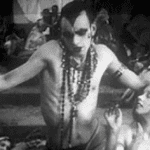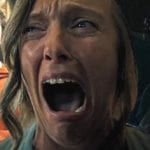 History
History  History
History  Health
Health 10 Everyday Activities That Secretly Alter Consciousness
 History
History Top 10 Historical Disasters Caused by Someone Calling in Sick
 Animals
Animals 10 New Shark Secrets That Recently Dropped
 Movies and TV
Movies and TV 10 Forgotten Realities of Early Live Television Broadcasts
 Technology
Technology 10 Stopgap Technologies That Became Industry Standards
 Weird Stuff
Weird Stuff 10 Wild Facts About Taxidermy That You Probably Didn’t Know
 Travel
Travel 10 Beautiful Travel Destinations (That Will Kill You)
 Miscellaneous
Miscellaneous 10 Modern Marriage Rituals Born from Corporate Branding
 Weird Stuff
Weird Stuff Ten Bizarre Visions of 2026 from Fiction
 History
History 10 “Modern” Problems with Surprising Historical Analogs
 Health
Health 10 Everyday Activities That Secretly Alter Consciousness
 History
History Top 10 Historical Disasters Caused by Someone Calling in Sick
Who's Behind Listverse?

Jamie Frater
Head Editor
Jamie founded Listverse due to an insatiable desire to share fascinating, obscure, and bizarre facts. He has been a guest speaker on numerous national radio and television stations and is a five time published author.
More About Us Animals
Animals 10 New Shark Secrets That Recently Dropped
 Movies and TV
Movies and TV 10 Forgotten Realities of Early Live Television Broadcasts
 Technology
Technology 10 Stopgap Technologies That Became Industry Standards
 Weird Stuff
Weird Stuff 10 Wild Facts About Taxidermy That You Probably Didn’t Know
 Travel
Travel 10 Beautiful Travel Destinations (That Will Kill You)
 Miscellaneous
Miscellaneous 10 Modern Marriage Rituals Born from Corporate Branding
 Weird Stuff
Weird Stuff Ten Bizarre Visions of 2026 from Fiction
Top 10 Movies That Feel Like An Acid Trip
Want to experience a psychedelic without actually having to consume a substance? Watch one of these movies. The films on this list are visually mesmerizing, have hypnotizing soundtracks, and feature some of the most unconventional story structures and plotlines in cinematic history.
10 Well Known Movies With Bizarre Backstories
10 2001: A Space Odyssey
2001: A Space Odyssey is a 1968 science fiction film from the visionary Stanley Kubrick. Considered by many to be one of the most ambitious films of all time, it attempts to tell the story of evolution from the time of primitive apes to the future of space travel.
The first ten minutes of the film show the daily lives of prehistoric hominids going about their existence until an alien monolith appears before them. This object is the one thing that remains constant throughout the film, showing up even millions of years later. The rest of the film follows a team of astronauts who set out on a mysterious mission, guided by a piece of artificial intelligence called HAL, who begins to display troubling behavior.
MGM studios spent $12 million on Odyssey, the most money they had spent on any film at the time. The initial billing as “an epic drama of adventure and exploration” was poorly received by audiences. Mike Kaplan, “the resident longhair in the publicity department of MGM” was brought in to rethink the film. He noted that younger audience members—those of the 1960s youth revolution—liked to get high during the concluding section of the film. Kaplan designed a poster, “The Ultimate Trip,” to appeal to this counterculture. The film has since come to be regarded as a classic with a reputation as a psychedelic film.[1]
9 Eraserhead
1977’s Eraserhead was the first full-length feature film from writer/director David Lynch. During his time at the American Film Institute in Los Angeles, Lynch produced this black and white, experimental, body horror film. It tells the story of Henry (John Nance), who discovers that a girl with whom he had a fling is now pregnant. He marries the expectant mother and moves her in with him. Already overwhelmed with the fear of becoming a father, things get even worse for Henry when the baby turns out to be a bizarre looking creature that won’t stop screaming. This drives the mother into hysteria, leaving Henry to care for the child while also burdened by a woman living in the radiator.
Lynch drew inspiration for the film’s oppressive mood from his own living conditions. “I saw so many things in Philadelphia I couldn’t believe … I saw a grown woman grab her breasts and speak like a baby, complaining her nipples hurt. This kind of thing will set you back.”[2]
8 Irreversible
The unrelenting Irreversible from 2002 was written and directed by Gaspar Noé and is almost impossible to sit through. One of the most controversial films ever made, its jarring visuals, 28 Hz sub audible sound, and graphic violence come together to create a truly unpleasant, if not unbearable, viewing experience. The film is told in reverse and chronicles a man (Vincent Cassell) who seeks revenge after his girlfriend (Monica Bellucci) is mercilessly raped and beaten in an underpass. The attack is brutally shown for nine painful minutes in one shot that never cuts away.
The low-frequency sound of the film’s first thirty minutes is almost inaudible. Similar to the noise produced by an earthquake, it can cause nausea and vertigo. Not surprisingly, moviegoers walked out during this sequence as a result of the sickening sound and even more sickening on-screen content. Roger Ebert witnessed critics exiting the film and admitted that he himself had to close his eyes during some of it. But Ebert adds that it was totally worth it. Viewers who stuck it out were rewarded with loving, innocent content.[3]
7 Inland Empire
Inland Empire is a 2006 experimental film from David Lynch, and it’s perhaps one of his most difficult to decipher. Laura Dern plays Nikki, an actress who takes on a role in a new film in which she plays a woman having an affair. The romantic interest in the film is Devon (Justin Theroux) of whom Nikki’s husband is very jealous. As Nikki’s onscreen persona starts to bleed into her real life, her world becomes a surreal nightmare, and she soon realizes that the film is a remake of one in which the stars were murdered.
Dern and Theroux, who each worked with Lynch on other projects, are both on record as saying that they have no idea what Inland Empire is actually about. The movie’s title provides little clarity, as it was nothing more than the byproduct of a conversation Lynch had with Dern, who told him that her husband was originally from Inland Empire in California. “I like the word inland, and I like the word empire,” Lynch simply said.[4]
6 Holy Motors
If you want to see something truly unique and original, 2012’s Holy Motors will not disappoint. After a 13-year gap, filmmaker Leos Carax made his return to feature filmmaking with this bizarre and enigmatic fantasy film that requires multiple viewings.
Denis Lavant plays the mysterious Monsieur Oscar, who is driven around Paris in a limousine by his loyal driver (Édith Scob). From dawn to dusk, Oscar “the actor” dresses up in costumes and plays a number of strange characters, but there are never any cameras or audiences.
A review by NPR describes the film as “a love letter to movies. But this isn’t a spot-the-references extravaganza; the more movies you’ve seen in your lifetime, the less sense Holy Motors is likely to make.[5]
10 Dark Theories Surrounding Beloved Kids Movies
5 Lost River
Lost River is the 2016 directorial debut of writer/director Ryan Gosling. The movie was undoubtedly inspired and highly influenced by greats like David Lynch and Nicolas Winding Refn, who directed Gosling in Drive and Only God Forgives (featured below). This fantasy-mystery film incorporates familiar elements that will be recognizable to those well-versed in avant-garde filmmaking, but it does so with a fresh take by Gosling.
A single mother (Christina Hendricks) living in the deteriorating and apocalyptic city of Detroit is swept into a dark underworld when one of her sons discovers a road that leads him to a secret underwater town that is home to a beast they must capture.
In his review of Lost River, Toronto Star critic Peter Howell wrote, “Designed to daze and confuse, and succeeding, Ryan Gosling’s directorial debut is a stunner in visual terms alone.” But the brilliant imagery wasn’t enough to garner more than a 31 percent from Rotten Tomatoes.[6]
4 Only God Forgives
Set in Bangkok, Only God Forgives is a 2013 crime-thriller written and directed by Nicolas Winding Refn. It stars Ryan Gosling as Julian, a drug trafficker who is sent on a mission by his mother (Kristin Scott Thomas) to avenge the death of his brother Billy.
Julian’s life gets more complicated when he discovers that his brother’s killer is the father of an underage prostitute whom Billy had raped and murdered. Julian believes that the father was justified in avenging his daughter’s death and won’t kill him.
Refn’s daughter, who was born with the ability to see ghosts, woke up screaming many nights in the Bangkok apartment where his family lived during production for six months. Refn explains that Thai culture’s readiness to accept these phenomena and send a shaman to cleanse the house made him realize “that spirituality and mysticism and reality has a different meaning in Asia and that’s when I really realized that this was the kind of movie I wanted to make.”[7]
3 Climax
Be sure to steer clear of psychedelic drugs while watching Gaspar Noé’s 2018 psychological horror film Climax. The film centers around a troupe of French dancers who are rehearsing for an upcoming tour at an abandoned school in the dead of winter.
After rehearsal, the dancers decide to cut loose and enjoy some sangria while getting to know each other. Little do they know that the sangria has been laced with LSD, and it’s not long before the celebration morphs into a hallucinatory nightmare.
Noé completed filming in 15 days. He got the idea for Climax in December 2017, and by the end of February 2018, it was ready for its Cannes debut. Incredibly, none of the movie’s talented performers are professional dancers.[8]
2 mother!
Jennifer Lawrence stars as a young woman who spends her days renovating the Victorian mansion that she lives in with her writer husband (Javier Bardem) in this 2017 psychological horror film written and directed by Darren Aronofsky. A stranger shows up late one night and knocks on their door. Before long, his wife and two children come along and make themselves at home. More unwanted guests begin to arrive and begin to take over the home, much to the young woman’s horror and her husband’s delight.
Interestingly, none of the film’s characters have actual names. There’s “Mother,” of course, and her husband, “Him.” Among the dozens of others are Man, Woman, Fool, Pisser, Fornicator, and Whoremonger![9]
1 Enter The Void
There’s only one film that could top this list: 2009’s Enter The Void. Writer/director Gaspar Noé takes the viewer on a psychedelic tour of life and death from the point of view of an American drug dealer (Nathaniel Brown) living in Tokyo who takes a powerful hallucinogen some DMT and brings the audience along for the ride.
During his trip, Oscar gets busted by police and ends up being shot and killed. The film, which is entirely shot in a first-person viewpoint, then transitions into an out-of-body experience as the deceased Oscar watches subsequent events unfold while floating above the neon-lit city streets, recalling moments of his life.
Los Angeles Times reviewer Robert Abele describes it like this: “Probing the fuzzy, synaptic turbulence of drug culture and life-after-death — ‘The Tibetan Book of the Dead’ is referenced early on, while Stanley Kubrick and Kenneth Anger get visual shout-outs — Enter the Void displays a dizzying virtuosity with the cinema of altered states.”[10]
Top 10 Bizarre Award Show Moments








